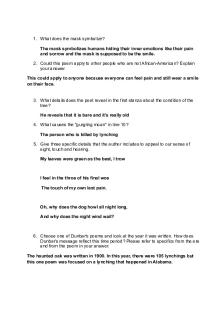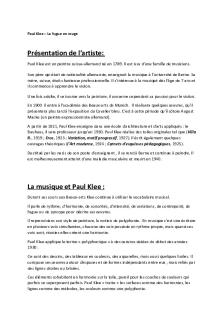Paul and Patricia Churchland PDF

| Title | Paul and Patricia Churchland |
|---|---|
| Author | Crisha De Guzman Punzalan |
| Course | Practical Research |
| Institution | University of Batangas |
| Pages | 6 |
| File Size | 156.9 KB |
| File Type | |
| Total Downloads | 44 |
| Total Views | 146 |
Summary
PHILOSOPHY...
Description
Paul and Patricia Churchland
An American philosopher interested in the fields of philosophy of mind, philosophy of science, cognitive neurobiology, epistemology, and perception. Churchland's central argument is that the concepts and theoretical vocabulary that pcople use to think about the selves using such terms as belief, desire, fear, sensation, pain, joy actually misrepresent the reality of minds and selves. He claims that the self is a product of brain activity. Neurophilosophy was coined by Patricia Churchland, the modern scientific inquiry looks into the application of neurology to age-old problems in philosophy. The philosophy of neuroscience is the study of the philosophy of science, neuroscicnce, and psychology. It aims to explore the relevance of neurolinguistic experiments/studies to the philosophy of the mind. Patricia Churchland claimed that man's brain is responsible for the identity known as sel. The biochemical properties of the brain according to this philosophy of neuroscience is really responsible for man's thoughts, feelings, and behavior. Paul Churchland is one of the many philosophers and psychologists that viewed the self from a materialistic point of view, contending that in the final analysis mental states are identical with, reducible to, or explainable in terms of physical brain states Being an eliminative materialist, he believes that there is a need to develop a new vocabulary and conceptual framework that is grounded in neuroscience. This new framework will be a more accurate reflection of the human mind and self.
Maurice Merleau-Ponty
A French philosopher and phenomenologist. According to him, the division between the "mind" and the "body" is a product of confused thinking. The self is experienced as a unity in which the mental and physical are seamlessly woven together.
Developed the concept of self-subject and contended that perceptions occur existentially. Thus, the consciousness, the world, and the human body are all interconnected as they mutually perceive the world. Phenomenology provides a direct description of the human experience which serves to guide man's conscious actions. He further added that, the world is a field of perception, and human consciousness assigns meaning to the world. Thus man cannot separate himself from his perceptions of the world.
Question: The self, according to Locke is _. Answer: Consciousness Question: Case Study: You come home and you find to your delight that your roommate has baked a cake. You would think 'Oh! I want that cake right now! That looks delicious!' You know your roommate's not going to be happy if you eat it, so first, you eat a little piece of the corner, and then you have to cut yourself a slice so it doesn't look disgusting, and then soon enough you've eaten the whole thing; it's gone. From the case above, which of the following choices is more dominant to you? Answer: ID Question: For Descartes, _ makes someone aware that they are thinking being thus, they exist. Answers: Doubting Question: If conscious is to ego then _ is to unconscious. Answers: Id Question: In which of among the determinants of Personality, can be commonly observed when a person behaves contrastingly and exhibits different traits and characteristics. Answer: Situational Factors of Personality Question: For David Hume's concept of self, when one touches an ice cube, the cold sensation is a/an _. Answers: impression Question: Socrates once said, "The only true wisdom is in knowing you know _." Answer: nothing Question:
__ is the state of having inconsistent thoughts, beliefs, or attitudes especially as relating to behavioral decisions and attitude change. Answers: Cognitive Dissonance Question: __ is the claim that people's common-sense understanding of the mind is false and that certain classes of mental states that most people believe in do not exist. Answers: Eliminative materialism Question: Plato emphasizes that _ in the human person can only be attained of the three parts of the soul are working harmoniously with one another. Answers: justice Question: Contains images that are not in awareness but that can become conscious either quite easily or with some level of difficulty. Answer: Preconscious Question: St. Augustine stated that real happiness can not be found in God. Answer: False Question: The three provinces of the mind are: Answer: Id, Ego, Superego Question: _ is traditionally considered as the major determinants of an individual’s personality. Answers: Culture Question: For Socrates, a human is composed of body and soul, the first belongs to the __ because it changed, it is imperfect, and it dies, and the latter belongs to ideal realm for it survives the death. Answers: physical realm Question: _ is responsible for reconciling the unrealistic demands of both the id and the superego with the demands of the real world. Answers: Ego Question: __ is often referred to as one of the most famous patients in neuroscience. He suffered a traumatic brain injury when an iron rod was driven through his entire skull, destroying much of his frontal lobe. Answers: Phineas Gage Question: This is primarily dependent on learning the difference between right and wrong, thus it is called moral principle. Answer: Superego Question: He is a Critique of Cartesian dualism. Answer: Gilbert Ryle
Question: In the Japanese proverb, the _ face is the truest reflection of who you are. Answer: 3rd Question: Constantly worrying about little things is an example of: Answer: Neuroticism Question: In biological Factors of Personality, the _ describes the tendency of the person to appear and behave the way their parents are. Answer: hereditary factors Question: A way to remember the Big Five Trait is with the acronym _. Answers: OCEAN Question: Descartes, famous principle the _ which mean I think therefore I exist, established his philosophical views on "true knowledge" and concept of self. Answer: Cogito, Ergo Sum Question: _ is the school of thought that espouses the idea that knowledge can only be possible if it is sensed and experienced. Answers: Empiricism Question: He is known as the Father of Modern Philosophy is: Answer: Rene Descartes Question: For Immanuel Kant, The self is the product of _. Answers: reason Question: In the Japanese proverb, the _ face is you show to your close friends, and your family. Answer: 2nd Question: An English philosopher and physician and famous in his concept of “Tabula Rasa” or Blank Slate that assumes the nurture side of human development. Answer: John Locke Question: _ is a character assumed by a writer or a performance artist. Answers: Persona Question: Plato illustrated his view of the self in "Phaedrus" in his metaphor: the soul is like a winged chariot drawn by two powerful horses: a white horse represent the _. Answers: Spirit
Question: The energy of eros is called _. Answers: libido Question: A _ is not the person itself no matter how intimately bound it is with the bearer. Answers: Name Question: The self is _ because it has a personality that is enduring and therefore can be expected to persist for quite some time. Answers: consistent Question: In the three components of soul, Plato also called the _ as divine essence. Answers: Reason Question: When a stranger approaches you and ask you a question, saying "Open Minded ka ba? Yung 100 pesos mo gawin nating 1000 pesos, tinatanggap mo ba ang offer ko?". And you responded to the stranger, saying, " Yes po, tinatanggap ko po ang inyong offer, paano po ba yan? ituro nyo nga sa akin para yumaman na ako." The statement above can best describes in which of the following Big 5 Trait? Answer: Agreeableness Question: A person with low score in _ tends to quickly and confidently asserts own rights. Answer: Agreeableness Question: According to him, the Cartesian Dualism is nothing else but a plain misunderstanding. The living body his thoughts, emotions and experiences are all one. Answer: Maurice Merleau-Ponty Question: A student who is always late in class or late in submitting requirements can be best describes as: Answer: Low Conscientiousness Question: Plato illustrated his view of the self in "Phaedrus" in his metaphor, The _ is a reason, whose task is to guide the chariot to the eternal realm by controlling the two independent-minded horses. Answers: Charioteer...
Similar Free PDFs

Paul and Patricia Churchland
- 6 Pages

Paul Laurence Dunbar - paul
- 1 Pages

Patricia Stallings Case
- 22 Pages

Patricia- Benner Theory
- 7 Pages

Relatorio DE Estágio Patricia
- 25 Pages

Potiki BY Patricia Grace
- 14 Pages

Butterflies by Patricia Grace
- 1 Pages

1.5- Provocame - Patricia Geller
- 47 Pages

Patricia Redondo - Infancias
- 2 Pages

TEMA 2 - Patricia Villanueva
- 3 Pages

PAUL Poiret
- 4 Pages

Paul Klee - essaie sur Paul Klee
- 2 Pages

Robert Mc Crae and Paul Costa
- 2 Pages
Popular Institutions
- Tinajero National High School - Annex
- Politeknik Caltex Riau
- Yokohama City University
- SGT University
- University of Al-Qadisiyah
- Divine Word College of Vigan
- Techniek College Rotterdam
- Universidade de Santiago
- Universiti Teknologi MARA Cawangan Johor Kampus Pasir Gudang
- Poltekkes Kemenkes Yogyakarta
- Baguio City National High School
- Colegio san marcos
- preparatoria uno
- Centro de Bachillerato Tecnológico Industrial y de Servicios No. 107
- Dalian Maritime University
- Quang Trung Secondary School
- Colegio Tecnológico en Informática
- Corporación Regional de Educación Superior
- Grupo CEDVA
- Dar Al Uloom University
- Centro de Estudios Preuniversitarios de la Universidad Nacional de Ingeniería
- 上智大学
- Aakash International School, Nuna Majara
- San Felipe Neri Catholic School
- Kang Chiao International School - New Taipei City
- Misamis Occidental National High School
- Institución Educativa Escuela Normal Juan Ladrilleros
- Kolehiyo ng Pantukan
- Batanes State College
- Instituto Continental
- Sekolah Menengah Kejuruan Kesehatan Kaltara (Tarakan)
- Colegio de La Inmaculada Concepcion - Cebu


